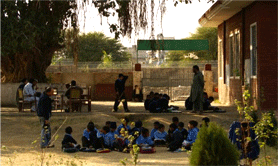Article 25-A Resources
Right to Free and Compulsory Education
The right to free and compulsory education is an internationally acknowledged right. It has been recognized in a number of international conventions, covenants and declarations. The Constitution of Islamic Republic of Pakistan 1973 acknowledged the right to free and compulsory secondary education in Part-II, Chapter 2, on Principles of Policy.
“The State shall remove illiteracy and provide free and compulsory Secondary Education within minimum possible period.” Article 37 (b), Part II, Chapter 2, Constitution of Islamic Republic of Pakistan 1973.
The right however remained non-justiciable ever since. In April 2010, Parliament passed Constitution (Eighteenth Amendment) Act, 2010. The amendment made the Right to Education justiciable, by insertion of Article 25-A, which obligates the state to provide free and compulsory education to all children of the age of 5 to 16 years in such a manner as may be determined by law.
“The State shall provide free and compulsory education to all children of the age of 5 to 16 years in such a manner as may be determined by law.” Article 25 A, Part-II, Chapter 1, Constitution of Islamic Republic of Pakistan 1973.
After the 18th Constitutional Amendment Education was devolved to the provincial mandate and it became the responsibility of the Parliament and Provincial assemblies to legislate for the provision of compulsory education in their respective jurisdictions. At the federal tier, Right to Free and Compulsory Education Act was enacted on December 24, 2012 for the Islamabad capital territory. Similarly Sindh Right of Children to free and Compulsory Education Act was enacted on February 13, 2013. Balochistan Compulsory Education Ordinance was promulgated in March 2013, and was later on passed by the Assembly and became an Act on February 4, 2014. The Punjab Free and Compulsory Education Ordinance 2014 was promulgated on May 13, 2014. The province of Khyber Pakhtunkhwa has yet to finalize its legislation for the provision of free and compulsory education.
Important International Instruments Acknowledging Right to Free and Compulsory Education
Right to Education is recognized in a number of international conventions, covenants and declarations important of these include:
• Universal Declaration on Human Rights (Article 26)
• International Covenant on Economic, Social and Cultural Rights (Articles 13 and 14)
• Convention on the Rights of the Child (Article 28)
• Convention on the Elimination of All Forms of Discrimination against Women (Article 10)
• Convention on the Rights of Persons with Disabilities (Article 24)
• UNESCO Convention against Discrimination in Education (Articles 4)
• ILO Convention 182 on Worst Forms of Child Labour (Preamble, Articles 7 and 8)
• African Charter on the Rights and Welfare of the Child (Article 11)
• African Youth Charter (Articles 13 and 16)
• Arab Charter (Article 41)
• Charter of the Organisation of American States (Article 49)
• Additional Protocol to the American Convention on Human Rights, Protocol of San Salvador (Articles 13)
• European Union Charter of Fundamental Rights (Article 14)
• Revised European Social Charter (Articles 10 and 17)
• ASEAN Human Rights Declaration (Article 31)



